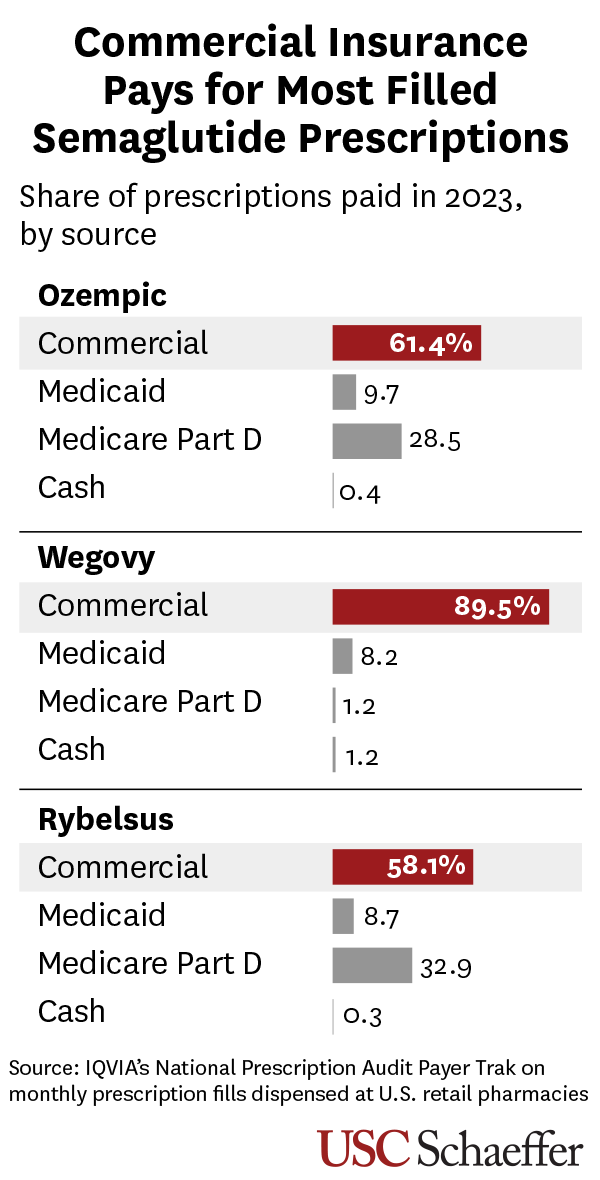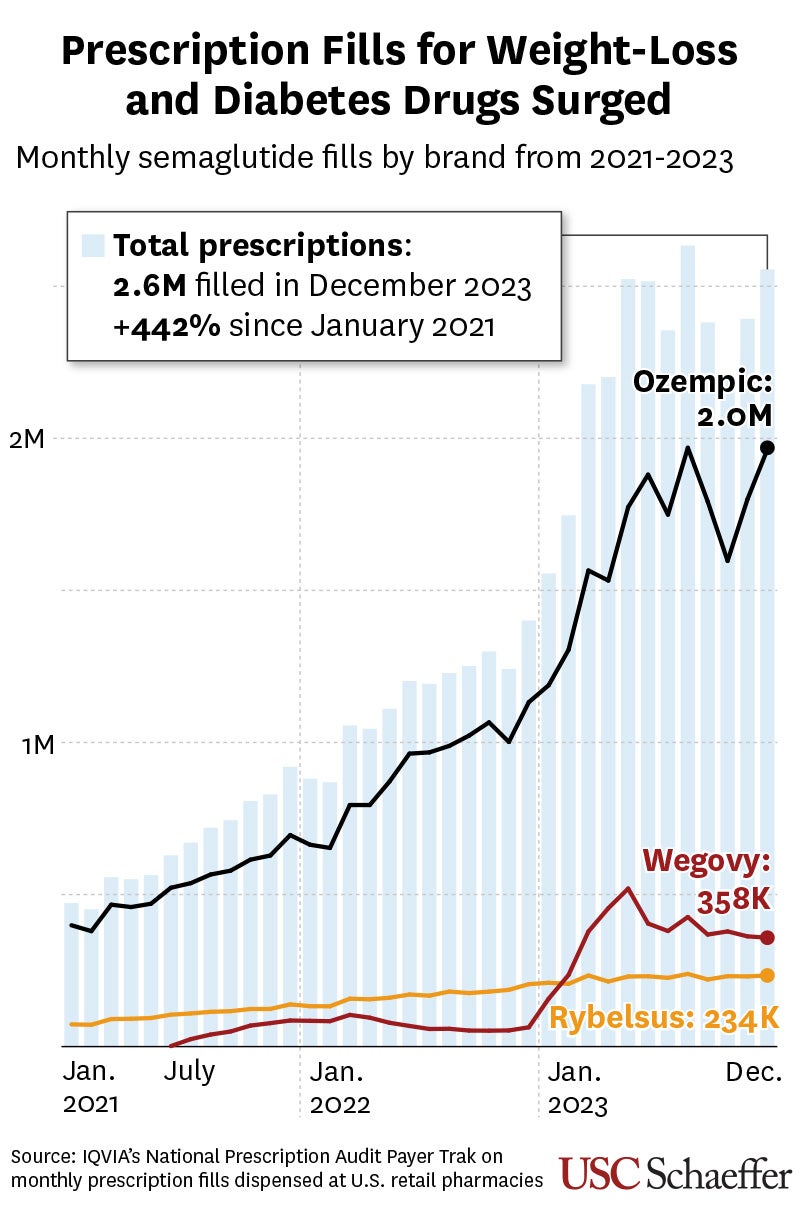Health
A USC study of prescription data shows that people with Medicaid or Medicare Part D may be missing out on powerful new obesity and diabetes drugs.
A new USC study suggests that publicly insured individuals who are most likely to benefit from new drugs for diabetes and obesity are less likely to get them than those with private insurance.
Prescription fills for the drug best known as Ozempic or Wegovy - semaglutide - increased by more than 400% between January 2021 and December 2023, according to research out Friday in JAMA Health Forum.
 Studies show that semaglutide - approved first for Type 2 diabetes, then for weight loss - also improves blood pressure and reduces cardiovascular disease. Those problems plague millions of Americans, but the lion's share of prescriptions went to people with private insurance.
Studies show that semaglutide - approved first for Type 2 diabetes, then for weight loss - also improves blood pressure and reduces cardiovascular disease. Those problems plague millions of Americans, but the lion's share of prescriptions went to people with private insurance.
"Given the proven cardiovascular benefits of Ozempic and Wegovy when used for diabetes or obesity, and the disproportionate burden of diabetes and obesity in Black/Latinx Medicaid and Part D populations, these findings suggest that their lower use in Medicaid and Part D may worsen disparities in diabetes and obesity outcomes," said senior author Dima Qato, an associate professor at the USC Alfred E. Mann School of Pharmacy and Pharmaceutical Sciences and senior scholar at the USC Leonard D. Schaeffer Center for Health Policy & Economics.
Ozempic, Wegovy and Rybelsus: More than just weight-loss drugs
"I think all the current attention in the media on semaglutide's anti-obesity effect obscures the fact that the drug is also hugely important for treating diabetes. It's the reason why I've been able to get some of my patients off insulin," said first author Christopher Scannell, a physician and postdoctoral researcher at the USC Schaeffer Center for Health Policy & Economics.
"If only certain patient populations get access to these medications - those primarily with private insurance, more generous health plans - then there's a huge percentage of the U.S. population that isn't getting access to these medications," he said. "And that brings up a very significant equity issue."
Ozempic and Wegovy are once-weekly injections; another form of semaglutide, Rybelsus, is a daily pill. Ozempic was approved in 2017, followed by Rybelsus in 2019, to treat Type 2 diabetes. Wegovy, approved in 2021, is a higher-dose version that's specifically approved for weight loss. Ozempic's sticker price is about $1,000 per month, while Wegovy is listed around $1,350.
For the study, researchers used data from IQVIA's National Prescription Audit PayerTrak, which captures 92% of prescriptions filled and dispensed to individuals at retail pharmacies in the United States.
Then, they calculated monthly fills for semaglutide by drug brand (Ozempic, Wegovy and Rybelsus) and by payment method (commercial insurance, Medicaid, Medicare Part D and cash) between January 2021 and December 2023.
 Prescription fills reached 2.6 million by December 2023. Ozempic persistently accounted for most of the prescriptions, but prescription fills for Wegovy soared by more than 1,361% between July 2021 and December 2023. Awareness of the drugs' weight-loss benefits shot up in late 2022 and likely contributed to shortages of Ozempic and Wegovy, first reported by the FDA in March 2022.
Prescription fills reached 2.6 million by December 2023. Ozempic persistently accounted for most of the prescriptions, but prescription fills for Wegovy soared by more than 1,361% between July 2021 and December 2023. Awareness of the drugs' weight-loss benefits shot up in late 2022 and likely contributed to shortages of Ozempic and Wegovy, first reported by the FDA in March 2022.
- Medicaid accounted for less than 10% of semaglutide fills for all three drug brands in 2023. Access via Medicaid is a state-level decision, Scannell said. Depending on the budget - and politics - of where you live, the drugs may or may not be covered. (Medicaid provides assistance to low-income people, the elderly and some people with disabilities.)
- Medicare Part D accounted for 28.5% and 32.9% of Ozempic and Rybelsus fills, respectively, in 2023; it only accounted for 1.2% of Wegovy fills. Medicare Part D doesn't cover the drugs for obesity unless a patient also has a comorbidity such as cardiovascular disease as well - the very problem Wegovy or Ozempic can prevent.
- Approximately 1% or less of all semaglutide fills went to people paying cash in 2023.
In the context of treating obesity, Scannell said, "If Medicare is only covering these drugs for patients who have obesity and a comorbidity, it may be forcing patients who only have obesity to develop these additional chronic conditions before they can get access to the medications. It's like saying, 'You have to be sick enough, then we'll cover that medication for you.'"
The researchers said future studies should examine how changes in Medicare Part D and Medicaid coverage restrictions influence disparities in access to these essential medications. In addition, further research could examine individual-level variables such as age, race and ethnicity and whether the drugs were prescribed for obesity or diabetes.
About this study: In addition to Scannell and Qato, other authors include John Romley, Rebecca Myerson and Dana Goldman, all of USC.






